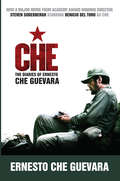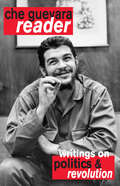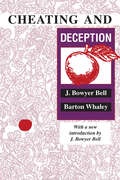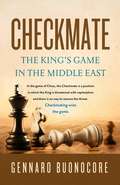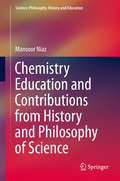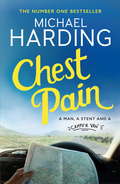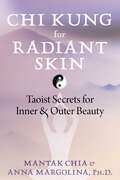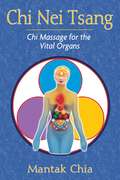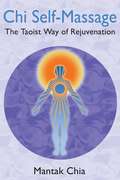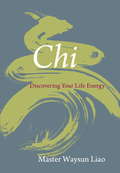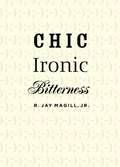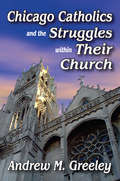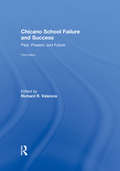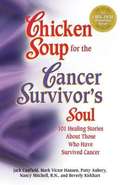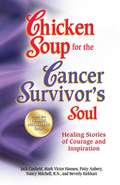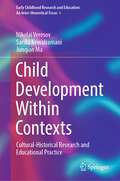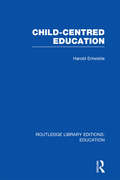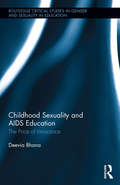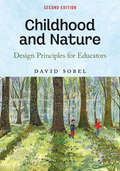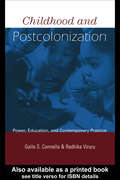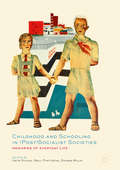- Table View
- List View
Che (Movie Tie-In Edition)
by Ernesto Che GuevaraThe book of Soderbergh's epic movie "Che," featuring a selection from Che's diaries, as well as his fiery speech at the United Nations, New York, in December 1964. With an extensive biographical chronology, this book shows the young Argentine's evolution from the wide-eyed medical student of "The Motorcycle Diaries" era to the revolutionary hero the world knows as Che.
Che Guevara Reader
by Ernesto Che Guevara David DeutschmannA new, revised and expanded edition of an Ocean Press classic.This reader is the bestselling, most comprehensive selection of Che Guevara's writings, letters and speeches available in English. This volume covers Che's writings on the Cuban revolutionary war, the first years of the revolution in Cuba and his vision for Latin America and the Third World. It includes such classic essays as "Socialism and Man in Cuba" and his call to create "Two, Three, Many Vietnams."Among the features of this expanded edition are several unpublished articles, essays and letters, including a letter from Che to his children shortly before his death in Bolivia in 1967 and an essay, "Strategy and tactics for the Latin American revolution."This new edition of a popular Ocean title is published in collaboration with the Che Guevara Archive in Havana. It includes:* an expanded and revised chronology* complete bibliography of the works of Che Guevara* new, extensive annotation and index"Deep inside the T-shirt where we have tried to trap him the eyes of Che Guevara are still burning with im-patience."--Ariel Dorfman
Cheating and Deception
by Barton Whaley J. Bowyer BellCheating and deception are terms often used but rarely defined. They summon up unpleasant connotations; even those deeply involved with cheating and deception rationalize why they have been driven to it. Particularly for Americans and much of Western civilization, official cheating, government duplicity, cheating as policy, and conscious, contrived deception, are all unacceptable except as a last resort in response to threat of extinction. As a distasteful tool, deception is rarely used to achieve national interests, unless in relation to the deployment of military force. As an area of study, it has by and large been ignored.Intrigued by attitudes toward cheating and deception, the authors decided to analyze its roots, structure, and process. They asked fundamental questions: are there categories of deception, general steps in the process of deception, and ways to evaluate its results across time and in different modes? The book that results is a typology of kinds of deception, beginning with military deception, but extending into other categories and stages.In his introduction to this new edition, Bell outlines how the book came to be written, describes the mixed emotions toward the subject displayed by govenmental and nongovernmental funding sources, and speculates about its critical and commercial reception. He discusses widespread new interest in the subject, the research that has been undertaken since this book was first published, and its limitations.This book provides a general overview of this complex subject, creating a framework for analysis of specific instances of cheating or deception. It will be of particular interest to political scientists, those interested in military affairs and strategy, and psychologists. The general reader will find the book written with a light touch, drawing examples of cheating and deception in the pursuit of love and money. The specialist reader will be intrigued by its broad-ranging examples drawn from policy and politics,
Cheating and Deception
by J. Bowyer BellCheating and deception are terms often used but rarely defined. They summon up unpleasant connotations; even those deeply involved with cheating and deception rationalize why they have been driven to it. Particularly for Americans and much of Western civilization, official cheating, government duplicity, cheating as policy, and conscious, contrived deception, are all unacceptable except as a last resort in response to threat of extinction. As a distasteful tool, deception is rarely used to achieve national interests, unless in relation to the deployment of military force. As an area of study, it has by and large been ignored.Intrigued by attitudes toward cheating and deception, the authors decided to analyze its roots, structure, and process. They asked fundamental questions: are there categories of deception, general steps in the process of deception, and ways to evaluate its results across time and in different modes? The book that results is a typology of kinds of deception, beginning with military deception, but extending into other categories and stages.In his introduction to this new edition, Bell outlines how the book came to be written, describes the mixed emotions toward the subject displayed by govenmental and nongovernmental funding sources, and speculates about its critical and commercial reception. He discusses widespread new interest in the subject, the research that has been undertaken since this book was first published, and its limitations.This book provides a general overview of this complex subject, creating a framework for analysis of specific instances of cheating or deception. It will be of particular interest to political scientists, those interested in military affairs and strategy, and psychologists. The general reader will find the book written with a light touch, drawing examples of cheating and deception in the pursuit of love and money. The specialist reader will be intrigued by its broad-ranging examples drawn from policy and politics,
Cheating, Corruption, and Concealment
by van Prooijen, Jan-Willem and van Lange, Paul A. M. van Prooijen, Jan-Willem van Lange, Paul A. M.Dishonesty is ubiquitous in our world. The news is frequently filled with high-profile cases of corporate fraud, large-scale corruption, lying politicians, and the hypocrisy of public figures. On a smaller scale, ordinary people often cheat, lie, misreport their taxes, and mislead others in their daily life. Despite such prevalence of cheating, corruption, and concealment, people typically consider themselves to be honest, and often believe themselves to be more moral than most others. This book aims to resolve this paradox by addressing the question of why people are dishonest all too often. What motivates dishonesty, and how are people able to perceive themselves as moral despite their dishonest behaviour? What personality and interpersonal factors make dishonesty more likely? And what can be done to recognize and reduce dishonesty? This is a fascinating overview of state-of-the-art research on dishonesty, with prominent scholars offering their views to clarify the roots of dishonesty.
Checkmate: The King's Game
by Gennaro BuonocoreA thoughtful and insightful exploration of the intricate dynamics shaping contemporary issues in the Middle East.Checkmate is a comprehensive look into the current Middle Eastern political and strategic reality which views the region as a giant chessboard to better understand the relationship between the players. However, in viewing the complexities of the Middle East, it is important to understand that strategy is not everything. This is a region of the world where emotions, passions, and cultural heritage have played the protagonists' roles. Considering historical implications, memories both physical and emotional, and the unfortunate consequences of cultural displacements, this essay explores the effects on social identities, which may result in prolonged strife and conflict. This work does not attempt to be a sociology treatise nor a policy paper. Rather, it is a collection of personal observations and experiences placed in the context of historical events. It focuses on the Middle East, but the concept could be applied to any area of the world. With this book, the author suggests that conflict, in the greater Middle East, cannot be mitigated until Western expectations are modified to include an understanding of the effects that cultural heritage has on regional dynamics.
Chemistry Education and Contributions from History and Philosophy of Science (Science: Philosophy, History and Education)
by Mansoor NiazThis book explores the relationship between the content of chemistry education and the history and philosophy of science (HPS) framework that underlies such education. It discusses the need to present an image that reflects how chemistry developed and progresses. It proposes that chemistry should be taught the way it is practiced by chemists: as a human enterprise, at the interface of scientific practice and HPS. Finally, it sets out to convince teachers to go beyond the traditional classroom practice and explore new teaching strategies. The importance of HPS has been recognized for the science curriculum since the middle of the 20th century. The need for teaching chemistry within a historical context is not difficult to understand as HPS is not far below the surface in any science classroom. A review of the literature shows that the traditional chemistry classroom, curricula, and textbooks while dealing with concepts such as law, theory, model, explanation, hypothesis, observation, evidence and idealization, generally ignore elements of the history and philosophy of science. This book proposes that the conceptual understanding of chemistry requires knowledge and understanding of the history and philosophy of science. "Professor Niaz''s book is most welcome, coming at a time when there is an urgently felt need to upgrade the teaching of science. The book is a huge aid for adding to the usual way - presenting science as a series of mere facts - also the necessary mandate: to show how science is done, and how science, through its history and philosophy, is part of the cultural development of humanity. " Gerald Holton, Mallinckrodt Professor of Physics & Professor of History of Science, Harvard University "In this stimulating and sophisticated blend of history of chemistry, philosophy of science, and science pedagogy, Professor Mansoor Niaz has succeeded in offering a promising new approach to the teaching of fundamental ideas in chemistry. Historians and philosophers of chemistry --- and above all, chemistry teachers --- will find this book full of valuable and highly usable new ideas" Alan Rocke, Case Western Reserve University "This book artfully connects chemistry and chemistry education to the human context in which chemical science is practiced and the historical and philosophical background that illuminates that practice. Mansoor Niaz deftly weaves together historical episodes in the quest for scientific knowledge with the psychology of learning and philosophical reflections on the nature of scientific knowledge and method. The result is a compelling case for historically and philosophically informed science education. Highly recommended!" Harvey Siegel, University of Miami "Books that analyze the philosophy and history of science in Chemistry are quite rare. ''Chemistry Education and Contributions from History and Philosophy of Science'' by Mansoor Niaz is one of the rare books on the history and philosophy of chemistry and their importance in teaching this science. The book goes through all the main concepts of chemistry, and analyzes the historical and philosophical developments as well as their reflections in textbooks. Closest to my heart is Chapter 6, which is devoted to the chemical bond, the glue that holds together all matter in our earth. The chapter emphasizes the revolutionary impact of the concept of the ''covalent bond'' on the chemical community and the great novelty of the idea that was conceived 11 years before quantum mechanics was able to offer the mechanism of electron pairing and covalent bonding. The author goes then to describe the emergence of two rival theories that explained the nature of the chemical bond in terms of quantum mechanics; these are valence bond (VB) and molecular orbital (MO) theories. He emphasizes the importance of having rival theories and interpretations in science and its advancement. He further argues that this VB-MO rivalry is still alive and together the two conceptual frames serve as the tool kit for thinking and doing chemistry in creati...
Chest Pain: A man, a stent and a camper van
by Michael HardingIn late 2018, Michael Harding was in a hotel room in Blanchardstown experiencing severe pains in his chest. He eventually phoned an ambulance and was admitted to hospital, suffering from an acute heart attack. Here, in Chest Pain, he looks at the months before the heart attack when he kept the signs of failing health from his beloved and instead retreated into solitude -- and with his own inimitable style and humour takes us with him through the months after a stent had been inserted in his heart, where he travels the roads of Donegal in a camper van in a journey back to the beloved, and to himself.Chest Pain is a thought-provoking, spell-binding memoir about togetherness and what it means to be alive.
Chi Kung for Radiant Skin: Taoist Secrets for Inner and Outer Beauty
by Mantak Chia Anna Margolina• Explores ancient Taoist wisdom and Chi Kung methods to restore the skin&’s ability to renew itself by regenerating your skin&’s chi, or vital energy• Presents easy step-by-step instructions for detoxifying techniques, circulation-enhancing activities, and energy cultivation for a radiant complexion• Shares Taoist secrets for beautiful hair and looks at the connections between beauty and emotionsPresenting a holistic approach to skin health, Taoist Master Mantak Chia and skin care expert Anna Margolina, Ph.D., share ancient Taoist wisdom and Chi Kung practices for a radiant complexion and ageless beauty.The authors explain how Beauty Chi Kung exercises restore the skin&’s ability to renew itself by regenerating your skin&’s chi, or vital energy. They offer Taoist energy-cultivation practices that work with the body&’s major systems to promote optimum circulation, relax muscular tension, reduce inflammation, restore immune system balance, and recharge your batteries to ensure the vitality of your body&’s outermost layer. Looking at common challenges to skin health, the authors reveal the key role of the skin in detoxification and what needs to be done to ensure the toxins your body is expelling do not stagnate at the skin level.Exploring skin renewal, the authors detail the practice of Stem Cell Chi Kung, showing how hydration and vibration can activate stem cells to support deep and extensive renewal of the skin&’s surface. They also look at several of Master Chia&’s classic Universal Healing Tao breathing and circulation practices that can help support inner and outer beauty.Revealing how to cultivate not only physical but also spiritual beauty, this Taoist guide to energetic skin care presents powerful and effective methods for achieving youthful radiance and glowing health at any age.
Chi Nei Tsang: Chi Massage for the Vital Organs
by Mantak ChiaAn ancient Taoist system for detoxifying and rejuvenating the internal organs • Presents techniques to clear blockages in the body’s energy flow • Includes illustrated exercises to relieve common ailments, revitalize the organs, and enable readers to take charge of their own health and well-being • Focuses on the navel center, where negative emotions, stress, and illness accumulate The techniques of Chi Nei Tsang evolved in Asia during an era when few physicians were available and people had to know how to heal themselves. Many people today have symptoms that modern medicine is not able to cure because a physical source for the problem is not easily found. The energies of negative emotions, stress, and tension--all common in modern life--and the weight of past illness accumulate in the abdominal center, causing energy blockages and congestion. When this occurs, all vital functions stagnate and myriad problems arise. By practicing the techniques of Chi Nei Tsang, this stagnation is removed and the vital organs surrounding the navel center are detoxified and rejuvenated. Master Chia teaches readers how to avoid absorbing negative energies from others and take full charge of their health through the self-healing techniques of Chi Nei Tsang. He offers fully illustrated exercises that show how to detoxify the internal organs and clear the energy (chi) channels throughout the body. He also presents methods for balancing emotions, managing stress, and observing the body in order to recognize, ameliorate, and prevent maladies before they become a problem.
Chi Self-Massage: The Taoist Way of Rejuvenation
by Mantak ChiaEnergetic massage techniques that dispel negative emotions, relieve stress, and strengthen the senses, internal organs, and nervous system • Shows how Chi Massage employs one’s own internal energy to promote rejuvenation • Presents Chi Massage techniques for every organ and bodily system • Provides a daily practice routine that requires only 5 to 10 minutes to complete The Western concept of massage primarily concerns muscle manipulation. In the practice of Chi Massage, internal energy, or Chi, is manipulated to strengthen and rejuvenate the sense organs--eyes, ears, nose, tongue, teeth, and skin--and the internal organs. The Taoist techniques in this practice are more than 5,000 years old and, until very recently, were closely guarded secrets passed down from master to student with each master often knowing only a small part of the complete method. In Chi Self-Massage Master Mantak Chia pieces together the entire system of Chi Massage into a logical routine, revealing the methods used by Taoist masters to maintain their youthfulness. He explains the energetic theory behind Chi Massage and how negative emotions affect the organs and nervous system. By practicing the exercises outlined and following the daily routine that requires only 5 to 10 minutes to complete, readers can strengthen their senses--most notably vision, hearing, and taste--detoxify their internal organs and glands, help control negative emotions, relieve stress and constipation, and improve their complexion, teeth and gums, and overall stamina.
Chi: Discovering Your Life Energy
by Waysun LiaoChi is the invisible energy of life that flows in and around us throughout the universe. Used skillfully, it can have a remarkable effect on health and vitality--to the degree that you'd be tempted to call it magical, if it weren't so completely natural. Here is a perfect introduction to chi that explains in a direct and simple way what it is and why it is essential to a healthy and vital life. It provides an easy-to-understand explanation of chi, and then helps readers recognize, develop, and strengthen their own chi through specific breathing techniques and basic exercises, all demonstrated by the author. There are many books on chi development through t'ai chi and qigong practice, but this one goes deeper to enable you to understand the fundamental principles as you cultivate it. This book is a reference for alternative health professionals such as acupuncturists and shiatsu therapists and their patients, as well as for anyone who practices t'ai chi, qigong, aikido, and other chi-based martial arts.To learn more about the author, please visit his website at www.taichitaocenter.com.
Chic Ironic Bitterness
by R. Jay Magill Jr.The events of 9/11 had many pundits on the left and right scrambling to declare an end to the Age of Irony. But six years on, we're as ironic as ever. From The Simpsons and Borat to The Daily Show and The Colbert Report, the ironic worldview measures out a certain cosmopolitan distance, keeping hypocrisy and threats to personal integrity at bay. Chic Ironic Bitterness is a defense of this detachment, an attitude that helps us preserve values such as authenticity, sincerity, and seriousness that might otherwise be lost in a world filled with spin, marketing, and jargon. And it is an effective counterweight to the prevailing conservative view that irony is the first step toward cynicism and the breakdown of Western culture.
Chicago Catholics and the Struggles within Their Church
by Andrew M. GreeleyWhat might one expect to learn from a probability sample study of the Archdiocese of Chicago? Can one form a national portrait of Catholics in the United States from data about Chicago? Certainly, Chicago is unique in its judgments about its clergy. As the eminent Catholic sociologist Andrew M. Greeley argues, it is this very difference that makes rigorous comparisons between Chicago Catholics and other Catholic subpopulations possible. He suggests that history and geography provide a basis for understanding the development of the Catholic Church not just in this specific area, but also in the entire United States. The Catholic Archdiocese of Chicago it composed of two counties, Lake and Cook. At the same time the Catholic population has been pushed up against the boundary of DuPage County by racial change in the city, so that much of the west and south side Catholic population of the city has moved into the southern and western suburbs. In this research area, half of the Catholics have attended college and half of those have attended graduate school. Thus, the conventional image of Chicago as a mix of ethnic immigrant neighborhoods has to be modified-although there are still many new immigrants attending special immigrant parishes. Greeley argues that the official church in Chicago, and by inference elsewhere, has not recognized the community structures that permeate the neighborhoods, that it does not grasp the religious stories that shape its peoples' identity, and it does not understand the intense, if selective, loyalty of the archdiocese to its leadership. As part of this argument, Greeley includes transcriptions of in-depth interviews with former Catholics. This study provides a fascinating window into the world of Catholicism in twenty-first century urban America.
Chicana/o Subjectivity And The Politics Of Identity
by Carlos GallegoThis book traces the influence of Hegel's theory of recognition on different literary representations of Chicano/a subjectivity, with the aim of demonstrating how the identity thinking characteristic of Hegel's theory is unwillingly reinforced even in subjects that are represented as rebelling against liberal-humanist ideologies.
Chicano School Failure and Success: Past, Present, and Future
by Richard R. ValenciaThe third edition of the best selling collection, Chicano School Failure and Success presents a complete and comprehensive review of the multiple and complex issues affecting Chicano students today. Richly informative and accessibly written, this edition includes completely revised and updated chapters that incorporate recent scholarship and research on the current realities of the Chicano school experience. It features four entirely new chapters on important topics such as la Chicana, two way dual language education, higher education, and gifted Chicano students. Contributors to this edition include experts in fields ranging from higher education, bilingual education, special education, gifted education, educational psychology, and anthropology. In order to capture the broad nature of Chicano school failure and success, contributors provide an in-depth look at topics as diverse as Chicano student dropout rates, the relationship between Chicano families and schools, and the impact of standards-based school reform and deficit thinking on Chicano student achievement. Committed to understanding the plight and improvement of schooling for Chicanos, this timely new edition addresses all the latest issues in Chicano education and will be a valued resource for students, educators, researchers, policy makers, and community activists alike.
Chicken Soup for the Cancer Survivor's Soul: 101 Stories of Courage and Inspiration from Those Who Have Survived Cancer
by Jack Canfield Mark Victor Hansen Patty Aubery Nancy MitchellMore than 100 cancer survivors share their personal stories in this touching new collection of Chicken Soup. These heartwarming accounts of courageous people who found the power to battle cancer in their endless hope, unwavering faith and steadfast determination will inspire you to adopt a positive attitude, discover your faith and cherish every moment. Just what the doctor ordered for healing your body, mind and soul.
Chicken Soup for the Cancer Survivor's Soul: Healing Stories of Courage and Inspiration
by Jack Canfield Mark Victor Hansen Patty Aubery Nancy Mitchell R. N Beverly KirkhartMore than 100 cancer survivors share their personal stories in this touching new collection of Chicken Soup. These heartwarming accounts of courageous people who found the power to battle cancer in their endless hope, unwavering faith, and steadfast determination will inspire you to adopt a positive attitude, discover your faith, and cherish every moment. Just what the doctor ordered for healing your body, mind, and soul.
Child Development Within Contexts: Cultural-Historical Research and Educational Practice (Early Childhood Research and Education: An Inter-theoretical Focus #6)
by Nikolai Veresov Sarika Kewalramani Junqian MaThis book examines the pedagogical encounters within children's ecological and socio-cultural historical contexts, and aspects of playful learning and development within these contexts. It addresses research and practices varying across learning contexts, providing easily adaptable exemplary practices leading to children's positive learning and development. The book offers a unified general cultural-historical theoretical model for exploring new contexts at different stages of children's learning and development. It suggests studying contexts as a source of development, as social situations of development. It analyzes play, early learning and the transition from play to school learning. It also explores the role of teachers and parents in supporting the development of executive functions, digital literacy, creative inquiries, problem solving and creativity as necessary and important prerequisites of children's school academic achievements. This volume contributes to the discourse on how children's learning is shaped in the 21st century era. It equips educators and parents with new and effective methods of creating developing contexts in their daily practice and to fully utilize the developing potential of existing contexts.
Child-Centred Education (Routledge Library Editions: Education)
by Harold EntwistleThis volume is a critical study of one of today’s most controversial topics in educational theory, setting the many arguments in perspective and clarifying the issues that arise when attention is focused on the learner. The author examines the problems of individual education, the distinctive demands childhood makes on the school and the claims of social education. The related questions of freedom, authority and discipline are then discussed, together with the ways in which curriculum development must take account of the learner’s interests, needs and dispositions in preparing him/her for life. The concept of educating the whole person is critically examined, together with the claim that education for life and the development of personal integrity require an integrated curriculum. Since child-centred educational theory is often dismissed as irrelevant to practice, the book concludes with an assessment of the various limitations which concern with practical activity imposes on educational theorists.
Childhood Sexuality and AIDS Education: The Price of Innocence (Routledge Critical Studies in Gender and Sexuality in Education #1)
by Deevia BhanaPrimary schoolchildren are frequently shielded from education on sexuality and sexually transmitted diseases in an effort to protect their innocence. In countries like South Africa, where AIDS is particularly widespread, it is especially important to address prevention with younger boys and girls as active social agents with the capacity to engage with AIDS as gendered and sexual beings. This volume addresses the question of children’s understanding of AIDS, not simply in terms of their dependence but as active participants in the interpretation of their social worlds. The volume draws on an interview and ethnographic based study of young children in two socially diverse South African primary schools, as well as interviews conducted with teachers and mothers of young children. It shows how adults sustain the production of childhood sexual innocence, and the importance of scaling up programs in AIDS intervention, gender and sexuality. It makes significant contributions to the global debate around childhood sexualities, gender and AIDS education.
Childhood and Nature: Design Principles for Educators
by David SobelChildhood and Nature is a guide for educators looking to foster in their students a love of nature as well as an understanding of complex environmental issues. This second edition brings new material and fresh insights to David Sobel's foundational exploration of place-based education.Sobel articulates seven design principles that teachers can use to build learning experiences: adventure, fantasy and imagination, animal allies, maps and paths, special places, small worlds, and hunting and gathering,. Pulling from recurrent play themes and real-world examples from educators, Sobel details placed-based projects and lessons for each principle. Students learn and develop vital skills through engagement with their local environments and communities. Miniature ecosystems in the "small world" of a sandbox, for example, can help children grasp larger, abstract ideas. A timely and actionable resource, Childhood and Nature shows how centering the world around us in education can create a generation of nature students, explorers, and protectors.
Childhood and Postcolonization: Power, Education, and Contemporary Practice (Changing Images of Early Childhood)
by Gaile S. Cannella Radhika ViruruThis book opens the door to the effects of intellectual, educational, and economic colonization of young children throughout the world. Using a postcolonial lens on current educational practices, the authors hope to lift those practices out of reproducing traditional power structures and push our thinking beyond the adult/child dichotomy into new possibilities for the lives that are created with children.
Childhood and Schooling in (Post)Socialist Societies: Memories of Everyday Life
by Zsuzsa Millei Iveta Silova Nelli PiattoevaThis book explores childhood and schooling in late socialist societies by bringing into dialogue public narratives and personal memories that move beyond imaginaries of Cold War divisions between the East and West. Written by cultural insiders who were brought up and educated on the eastern side of the Iron Curtain - spanning from Central Europe to mainland Asia - the book offers insights into the diverse spaces of socialist childhoods interweaving with broader political, economic, and social life. These evocative memories explore the experiences of children in navigating state expectations to embody "model socialist citizens" and their mixed feelings of attachment, optimism, dullness, and alienation associated with participation in "building" socialist futures. Drawing on the research traditions of autobiography, autoethnography, and collective biography, the authors challenge what is often considered 'normal' and 'natural' in the historical accounts of socialist childhoods, and engage in (re)writing histories that open space for new knowledges and vast webs of interconnections to emerge. This book will be compelling reading for students and researchers working in education, sociology and history, particularly those within the interdisciplinary fields of childhood and area studies. 'The authors of this beautiful book are professional academics and intellectuals who grew up in different socialist countries. Exploring "socialist childhoods" in myriad ways, they draw on memories, and collective history, emotional insider knowledge and the measured perspective of an analyst. What emerges is life that was caught between real optimism and dullness, ethical commitments and ideological absurdities, selfless devotion to children and their treatment as a political resource. Such attention to detail and examination of the paradoxical nature of this time makes this collective effort not only timely but remarkably genuine. ' --Alexei Yurchak, University of California, USA
Childhood in Society
by Rory Mcdowall ClarkChildhood can only be understood in relation to the multitude of social factors which surround it. This accessible text explores children’s place within society through an examination of the different contexts within which a child exists. It begins by looking at the child within the family then goes on to examine the child within the educational setting, the community, the nation and the global perspective. The child's own perspective is explored, recognising children as social agents in their own right. Finally it examines the current climate, making links with Every Child Matters, and considers today's public perceptions of childhood.
